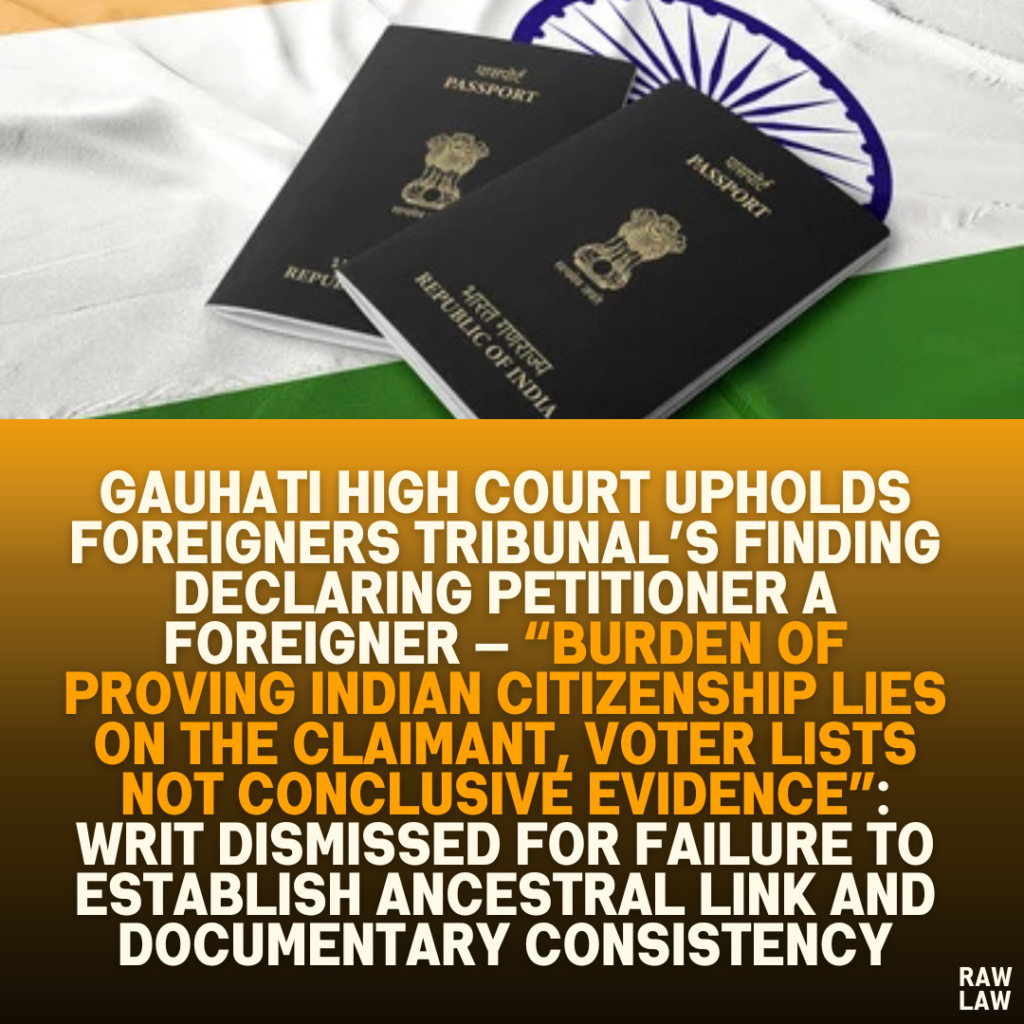Court’s Decision
The High Court dismissed the writ petition and upheld the Foreigners’ Tribunal’s decision that the petitioner was a foreigner who entered India after March 25, 1971. The court found that the petitioner failed to establish her Indian citizenship through legally admissible evidence. Since the burden of proof in such matters lies on the individual, her failure to provide satisfactory documents resulted in her claim being rejected.
Facts
- The Foreigners’ Tribunal had declared the petitioner a foreigner, stating she migrated to India post-1971.
- The petitioner claimed to be born and raised in Assam and provided voter lists to prove her parents’ Indian citizenship.
- The investigating authorities contended that she had no valid documentation to prove her ancestry or continuous residence in India.
- There was a discrepancy in her father’s name in official records, which weakened her claim.
- The petitioner had been listed in voter rolls post-1989, but the tribunal found inconsistencies in the documents presented.
Issues
The court examined the following legal questions:
- Was the Tribunal’s decision justified, or was it perverse?
- Did the petitioner successfully discharge the burden of proving her Indian citizenship?
- Were there procedural lapses by the investigating authorities that warranted court intervention?
Petitioner’s Arguments
- Voter Lists as Proof: She claimed that her father was listed in Indian voter rolls in 1966 and 1970, thereby proving her Indian citizenship.
- Continuous Residency in India: She argued that she was born in Assam, married there, and listed in electoral rolls post-1989.
- Incorrect Name in Records: She challenged the tribunal’s reliance on an incorrect entry that stated her father’s name as “Mahammad Ali” instead of “Chandu Sk.”
- Faulty Investigation: She alleged that the investigating officer did not conduct proper verification before making a reference to the Tribunal.
- Reliance on Legal Precedent: She cited State of Assam & Ors. vs. Moslem Mondal & Ors. (2013), where the Supreme Court emphasized proper investigation before declaring a person a foreigner.
Respondent’s Arguments
- Failure to Prove Parental Linkage: The petitioner failed to provide valid documents proving that the individuals listed in old voter rolls were her parents.
- Discrepancies in Age: In the 1989 voter list, her age was recorded as 30 years, but in 1997, it was listed as 27, creating inconsistencies.
- Lack of Rectification Efforts: The petitioner never sought to correct her father’s name in official records, which weakened her credibility.
- Burden of Proof on the Petitioner: The Foreigners Act, 1946, Section 9 clearly states that the burden of proving citizenship lies entirely on the individual, and she had failed to meet this requirement.
- Reliance on Supreme Court Ruling: The State relied on Sarbananda Sonowal vs. Union of India (2005), where the Supreme Court ruled that illegal migration threatens national security and citizenship claims must be strictly scrutinized.
Analysis of the Law
- Burden of Proof:
- Under Section 9 of the Foreigners Act, 1946, the individual claiming Indian citizenship must provide convincing proof.
- The petitioner did not produce valid documents proving her parental linkage and citizenship status.
- Procedural Fairness:
- Courts must ensure a fair procedure, but cannot endlessly extend proceedings when the petitioner fails to provide proper evidence.
- Voter Lists as Evidence:
- Being listed in a voter list is not conclusive proof of citizenship, especially if there are discrepancies in names, relationships, or birthdates.
- Land Documents and Gaonburah Certificates:
- These are not strong evidence of citizenship unless supported by other legally valid documents.
Precedent Analysis
The court referred to two key Supreme Court cases:
- Sarbananda Sonowal vs. Union of India (2005):
- The court ruled that large-scale illegal migration posed a national security threat and that tribunals must enforce strict standards in determining citizenship.
- State of Assam vs. Moslem Mondal (2013):
- This case discussed the importance of proper investigation before declaring a person a foreigner.
These precedents reinforced the court’s view that the burden was on the petitioner, and she failed to meet the legal requirements.
Court’s Reasoning
- Failure to Establish Ancestral Linkage:
- The petitioner failed to prove her parental connection to individuals listed in older voter records.
- Inconsistencies in Age Documents:
- The contradictory ages in different voter lists made her claims unreliable.
- No Effort to Correct Name Discrepancy:
- The petitioner never approached authorities to correct her father’s name in records, weakening her case.
- Ample Opportunity Provided:
- The Foreigners’ Tribunal granted multiple opportunities for her to present her case, but she failed to provide satisfactory evidence.
- Limited Scope of Judicial Review:
- Under Article 226 of the Constitution, courts can intervene only in cases of procedural irregularity or jurisdictional error—which were not present in this case.
Conclusion
- The court dismissed the petition and affirmed the Tribunal’s decision.
- Since the petitioner failed to discharge the burden of proof, her claim was rejected.
Implications
- Reinforcement of Burden of Proof:
- This case reaffirms that citizenship claims require strong documentary proof, and the burden lies entirely on the claimant.
- Limited Judicial Intervention:
- High Courts will not interfere with Foreigners’ Tribunal decisions unless there is clear procedural irregularity.
- Impact on Future Citizenship Claims:
- Similar cases involving voter list discrepancies and lack of birth records will likely face stricter scrutiny.
- Importance of Accurate Documentation:
- Individuals must maintain proper records and seek timely corrections in official documents to avoid citizenship disputes.




Pingback: Supreme Court Grants Maternity Leave to Woman Employee with Two Children from Previous Marriage — "The Present Conception is from the Subsisting Marriage, Entitling Her to Maternity Leave Under Fundamental Rule 101(a)" - Raw Law